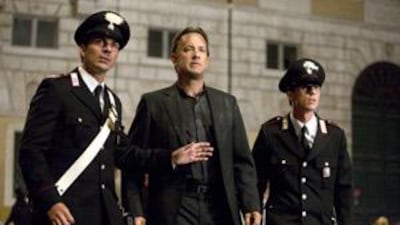Bestselling author Dan Brown provides his millions of fans with Origin, a new novel starring globe-trotting super-intellect cryptologist Professor Robert Langdon, who's invited to an enigmatic meeting at the Guggenheim Bilbao in Spain by his former Harvard student Edmond Kirsch, "a billionaire computer scientist, futurist, inventor and entrepreneur".
“This building doesn’t just break the rules,” he thinks. “It ignores them completely.”
Kirsch, a crude Elon Musk stand-in, is a specialist in game theory and computer science, and he’s always been a glamorous iconoclast.
In the opening chapter, we see him climbing to a mountain-top sanctuary in Catalonia to talk with a trio of Christian, Jewish and Muslim leaders he sardonically thinks of as “The Three Wise Men”.
The atmospherics of the meeting are predictably theatrical – "The wind whipped harder as they arrived at the ancient stone edifice. Inside the dim light of the building's entryway, the air was heavy with the thick fragrance of burning frankincense" – a fitting backdrop to the bombshell revelation Kirsch intends to drop on the world's leading religions at the Bilbao meeting, to which he has invited his former teacher.
Brown fans will be able to predict the rest with an extensive amount of accuracy: Kirsch’s grandiose plans go badly awry, and suddenly Langdon and a seemingly obligatory beautiful young female assistant (this time called Ambra Vidal, not that it matters in the least – the two words of her name are the sum total of the personality Brown bothers to give her) are chasing after clues to identify a killer before shadowy religious organisations manage to stop them.
There are lengthy potted travel guide descriptions of every location, and key sequences are set in Sharjah and Dubai. There are tinny, unimaginative descriptions of works of modern art by figures like Jackson Pollock, Andy Warhol and Mark Rothko. The dialogue of all the characters, major and minor, is always ridiculous.
Allegedly brainy Langdon is at almost every turn an imbecile. And all organised religions are thoroughly, cartoonishly evil, enemies not only of all science but of all genuine faith. The worldview on display bristles with the kind of cheap cynicism second-rate thinkers so often mistake for wisdom. Readers, to say nothing of book reviewers, will find nothing new here.
There's a very real sense in which a book like Origin is not only dismissive of book reviews but scornful of them. Brown and his fellow airport-bookstore bestselling authors stand apart from any kind of professional feedback as surely as their cinematic equivalents do.
As many as 14,000 film critics could decry in unison the next Avengers movie, and it will still go on to gross $2.5 billion (Dh9.2b) with another billion in merchandising.
Likewise, Tom Clancy or Danielle Steele never agonised over a bad review. And the reason in both cases is the same: these products, for all their glossy veneer, are packaged nostalgia. Their power comes not from their technical or aesthetic accomplishments, but from the fact that millions of their customers have fond memories of their predecessors.
Brown's 2003 novel The Da Vinci Code has sold well over 100 million copies. It's been in print constantly since its first appearance and will likely be in print for decades to come. The 2006 Tom Hanks movie adaptation directed by Ron Howard made nearly US$800 million (Dh2,938 million) worldwide. But even these figures don't capture the full extent of the book's ubiquity. It spawned countless reading groups.
It provoked hundreds of thousands of online reader-reviews and a shelf full of published scholarly responses hoping to cash in on some of the money it was generating. It inspired guided tours of Rome that were, for years, more popular with tourists from all over the world than any other way of seeing the Eternal City. A whole sub-genre of thriller fiction – in which a modern-day organisation with deep historical roots will stop at nothing to prevent its darkest secrets from coming to light – exists and thrives now almost solely due to this one book.
Authors who strike that kind of gold no longer need to care about the small change of producing actual literary quality. They know – Brown surely knows – that the most their fans and investment brokers expect from them is more of the same. Slight variations are permissible – Langdon’s companion is not called “Ambra Vidal” in every book, for instance, and he isn’t always legging it around in Spain – but actual inventiveness is beyond these writers and would be bad for business even if it weren’t.
Kirsch’s bombshell is an advanced computer simulation that conclusively demonstrates a creation-story model that has no supernatural elements in it at all, no gods of any kind. It’s been an obsession of Kirsch since he was a student, when Langdon told him, “Well, science and religion are not competitors, they’re two different languages trying to tell the same story.”
The idea that a computer simulation would fundamentally destroy the faith of billions in their religions is so utterly, cluelessly juvenile that it seems right at home in a Brown novel. But in Origin, even the slight narrative energy that kept the earlier novels afloat seems missing, or oddly muted.
"Fact: All art, architecture, locations, science and religious organisations in this novel are real", Brown tells us.
But if this is what you do with all those facts, so what?
_____________________
Read more:
Sinatra’s manager taps into ageing singer’s decline in new book
Toni Morrison’s commentary on race continues in The Origin of Others
Irvine Welsh says dance music is the rhythm behind his novels
_____________________

